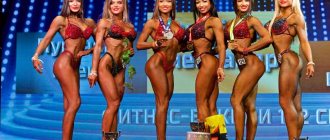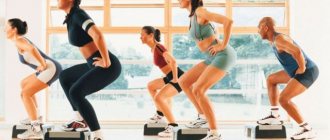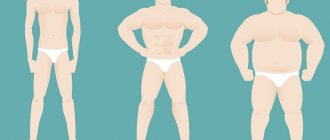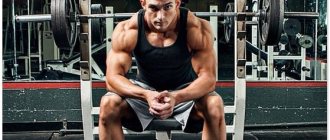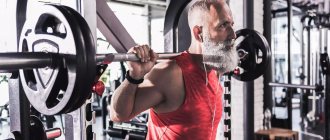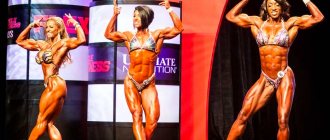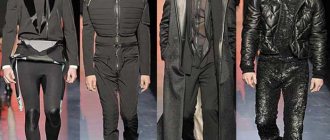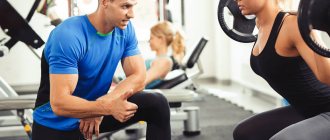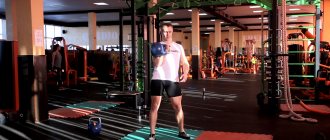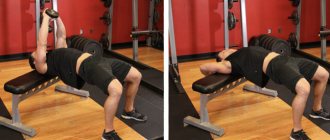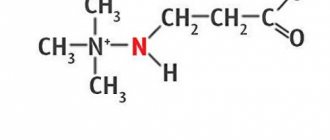BODYBUILDING
(from the English body - body and build - to build) is a sport whose goal is the maximum development of all muscle groups of the athlete and the construction of standard body proportions, which is assessed during competitions (in various weight categories).
The competition is divided into several rounds and includes mandatory and free posing, during which participants (in a group and individually) must demonstrate certain muscle groups from one angle or another: double biceps, triceps, abs, thighs, etc. Judges evaluate the performance of athletes according to several criteria in points, which are then summed up. Also on topic:
FITNESS
Bodybuilding is divided into amateur and professional. Competitions are held separately for men and women, as well as in mixed (and team) categories. Cultivated in many countries. In the USSR, instead of the word “bodybuilding”, concepts such as “bodybuilding” and “athletic gymnastics” were usually used.
What is bodybuilding.
The fundamental idea of bodybuilding is that you can mold anyone into anything. Unlike weightlifting, on the basis of which it originated, in bodybuilding it does not matter how much weight an athlete can “take” (or “squeeze”). The results that are reflected in his appearance are important: equally and proportionally worked muscles (large and small), their volume and relief (ratio of muscles and fat). Bodybuilding competitions cannot be won by an athlete with powerful arms, but skinny legs, or a good back, but a “beer belly.” In fact, bodybuilding is physical education, body culture. Hence another name for this sport: “bodybuilding”.
Also on topic:
MUSCLES
Sports and medicine.
Bodybuilding is a sport “on the verge of medicine”, the development of which directly depends on relevant scientific developments. The regime - proper nutrition, sleep and training schedule - plays no less a role than the training itself. Even an amateur bodybuilder will not be able to achieve noticeable results without carefully counting the calories and proteins he absorbs and without taking special nutritional supplements. These supplements include many nutrients that constantly recovering and growing muscle mass requires: additional proteins, proteins, vitamins, minerals, etc. The formulation of supplements and the pattern of their consumption are developed by specialists; by now, this has essentially become a separate scientific branch .
The most popular problem in bodybuilding is doping
, anabolic steroids and other “chemicals” that cause addiction and destroy the athlete’s body. It is no secret that in many sports, some professionals secretly use doping. But only in bodybuilding, steroids that guarantee maximum results (growth of muscle mass) with a minimum of effort are popular among amateurs. Although famous bodybuilders constantly claim that they achieved their titles without anabolic steroids, few amateur athletes seem to believe them. Doping remains one of the favorite topics for bodybuilding debate. However, the names of some bodybuilding organizations include the word “natural”, which, according to the founders, indicates their freedom from doping. It is also known that the most influential IFBB, the International Federation of Body-Builders (IFBB), received official recognition from the IOC only after it recognized the Anti-Doping Code of the Olympic Movement and introduced an appropriate doping control system.
Victor Shamin. Everything you need to know about NBC
Just the day before yesterday, information about the new bodybuilding organization NBC was announced and then chaos began. At least - in our understanding of what and how it works in this organization. Therefore, today we called Victor Shamin, the head of NBC, and asked him to explain to us all the incomprehensible points.
Photo by: Alexander Chepurnyak
GENERATION IRON RU: After our post on Instagram with the NBC video, there was a flurry of comments from Centerpodium, the organizer of the NPC tournament in November 2022, at which 7 IFBB PRO cards will be distributed. You were even accused of having a fake organization. Explain please, what is this? VICTOR SHAMIN: Yes, in recent days there have been a number of misunderstandings online. As you can see from the name, NBC is a different organization than the NPC, but its main task is to work according to the NPC rules and send athletes to their tournaments. So that in the future our athletes can receive IFBB PRO qualifications. I correspond regularly with Jim Manion, so there is no arbitrariness on my part.
GI RU: When can we expect the first tournaments from NBC? V.Sh.: In the spring of 2022. The first tournament will be in Ryazan. The exact dates are already known. The organizer will be Alexey Shaev. Now we are waiting for the NPC calendar so that we can match our tournaments to their calendar.
GI RU: Why do you have open judging? V.Sh.: When holding competitions on the TTVT project, we also made the judging open. And I saw how responsible the judges are when they understand that their assessments are being broadcast. It is very important. Open judging should add fairness to our sport, openness and greater understanding for spectators. Many other sports that are also subjective have an open judging system, and I don’t understand why our sport doesn’t.
GI RU: Does your organization disqualify athletes? V.S.: We, of course, do not have a disqualification. I believe that an athlete should choose for himself where and when to perform. How can you limit athletes when they are already not in the best conditions when building their sports career?
GI RU: Vit, wait, you are not contradicting yourself when you say that you will work according to the NPC rules, but there will be no disqualifications. As far as I know, there should also be disqualifications in the NPC/IFBB PRO League. V.Sh.: No. There are no disqualifications for NPCs. Available only in the IFBB PRO League. While you are an amateur, you can move from one organization to another as much as you like. If we take the example of Vitaly Fateev. He was disqualified for participating in Elite from the IFBB PRO League, but no one will forbid him to compete again in the NPC and get an IFBB PRO card and compete there again.
GI RU: How many athletes do we have in bodybuilding who can really lay claim to a successful career in the IFBB PRO League? Honestly, in my opinion, I don’t want to offend anyone, it’s only Ashot Kagramanyan. V.S.: The fact is that the situation now is a little different than a year ago and will change a lot every year. Now in Europe and Asia there are a very large number of IFBB PRO tournaments where athletes can express themselves. And traveling/flying is not as far and expensive as to America. As for Olympia, you were right about Ashot, he can get into the TOP 6 of Olympia, or even higher if he gets enough volume. Sergey Kulaev, if he can continue to grow, get into the top 10 Olympia prizes. Well, in the major leagues Messi and Ronaldo are also just a few out of millions. Look at football: there is constant evolution there. Now video replays have been introduced, and we need to change. Bodybuilding in Russia has not been going in the right direction for a very long time. And Alexander Vishnevsky, having come to the post of president of the FBI, began to change a lot, and he is already succeeding. And when there are large-scale changes in Russian bodybuilding, there will be more athletes in the format of Ashot and Sergei Kulaev
Follow us:
in VK: https://vk.com/generationironru Instagram: https://www.instagram.com/generationironru/ YouTube: https://www.youtube.com/c/GenerationIronRussia Telegram: https://t.me /wwwgenerationironru
Bodybuilder training.
Many people mistakenly imagine bodybuilding solely as a system of exercises with weights, i.e. special exercise equipment and free weights: kettlebells, barbells, dumbbells. In other words, we mean only power, moderately static anaerobic
exercises.
In fact, aerobic
exercise (aerobics, running, martial arts, skiing, tennis, all kinds of moving exercises without weights aimed at developing endurance and associated with increased heart rate and fat burning) are no less important in bodybuilding. Anaerobic exercise allows you to increase weight, and aerobic exercise allows you to create relief, “dry” muscles, and make the body a kind of visual aid to anatomy.
It is worth noting that bodybuilders look exceptionally sculpted - with every tiny muscle and vein on display - only during competitions. They go on strict diets, train in rubber suits, dehydrate the body with diuretics - all this in order to dry out the accumulated mass. Moreover, if doping control detects diuretics in the athlete’s blood, he will be disqualified - in accordance with the IFBB directive (corresponding restrictions apply in other bodybuilding associations, but the lists of drugs prohibited for use and the doping control systems adopted in various organizations have some differences) . True, diuretics are not only chemical, and any doping control has loopholes. The hardest time is for bodybuilders who ignored aerobics, gained weight, but did not achieve endurance. They are not able to easily burn fat, and therefore they focus on fasting and the mentioned diuretics, losing muscle mass and health with fat and water.
A bodybuilder gains muscle mass through weight training, exposing his body to deliberate stress loads. Training is built in accordance with two fundamental principles. The first is the principle of isolation
, to which the simulators best correspond.
The simulator only works the muscle being trained (muscle group), the rest of the body does not get tired unnecessarily, and the bodybuilder can control the load and progress of a specific muscle. If he trained all the muscles at the same time, as in aerobics, he would not be able to accurately assess which of them was really tired, and how to load the one that was not working enough yet. The second principle is the principle of “shocking” the muscles
. The loads should constantly increase, and the muscles should be completely exhausted during each workout. During recovery and sleep, muscles grow to accommodate the increased workload. If an athlete gets enough sleep, supplies the body with vitamins and proteins to build muscles, his physical parameters will steadily progress.
The origins of bodybuilding. Eugene Sandow (1867–1925).
The first serious training programs were developed by the generally recognized pioneer of modern bodybuilding, a native of Germany, Eugene Sandow (real name - Friedrich Wilhelm Müller). A figurine with his image is the most honorable award in modern professional bodybuilding; it is received by the winners of the Mr.
Olympia
.
Like his colleagues, Sandow began his career by demonstrating strength tricks. He soon realized that his personal achievements were not limited to the mere weight of the weights he lifted: he managed to develop powerful, harmonious muscles worthy of the envy of the ancient Greek. Sandow based his new show on a demonstration of muscles, during which he imitated the poses of ancient sculptures (thus laying the foundations for bodybuilding posing
). With this show, the athlete traveled all over Europe and America.
In England, over time, he created a whole network of athletic clubs and began publishing a specialized magazine. And in the fall of 1901 he held the first ever organized bodybuilding tournament in London. Sandow's authority was so high that he was appointed to the position of personal trainer to the English King George V (ruled 1910–1936). While in this position, Sandow did a lot to increase government funding and develop sports. He also published his training programs and published study guides.
His brilliant career was cut short in the 1920s, according to the official version, due to a stroke. Sandow allegedly followed the lead of the crowd of onlookers who witnessed the road accident and agreed to the offer to pull the car that had landed there out of the ditch with one hand: overexertion caused a cerebral hemorrhage.
The Wider brothers and the bodybuilding industry.
If Eugene Sandow is rightfully considered the “grandfather” of bodybuilding, then Joe Weider (the legendary trainer of champions, who in 1946, together with his brother Ben, created the IFBB, which already includes 177 countries, and who invented the most prestigious competition among professional bodybuilders - “Mr. Olympia” ) is called nothing less than the “father” of this sport.
The Widers did not create the industry from scratch - it existed before: with its own training manuals, specialized magazines, competitions and training halls. But it was the Wider brothers who raised this sport to a fundamentally new level. And it was they who lured the future legendary Terminator (and now governor) to America - the Austrian Arnold Schwarzenegger, who over time managed to win seven gold Sandow statuettes and became perhaps the most iconic figure in the history of world bodybuilding.
Professional bodybuilding.
According to some reports, there are now about 200 professional bodybuilders around the world. They have the appropriate “professional cards” (to obtain it you must win a competition of international significance) and are maintained by a federation, i.e. earn money by training and competing in various competitions - regardless of whether they win the main prize.
The competitions are strictly regulated. For example, according to the IFBB rules, only professionals who are a prerequisite can participate in the Mr. Olympia competition! - members of the Federation. However, they do not have the right to participate in competitions organized by other federations and associations. (These rules were introduced back in the days of Schwarzenegger, who, being a practical man and dependent on the Wider organization, preferred Olympia to further participation in the Mr. Universe competitions, in which he had previously won several victories.)
Under the auspices of the IFBB, competitions are held among professionals in the categories: bodybuilding (male and female), fitness (women) and body fitness (women), based on the results of which candidates for participation in the competitions “Mr. Olympia”, “Miss Olympia”, “ Fitness Olympia" and "Body Fitness Olympia". In addition to the Olympia, the Arnold Classic (men's), Miss International (women's bodybuilding), Miss Fitness International and Figure International competitions, held annually by Schwarzenegger and boasting a substantial amount of prize money, are particularly popular, as well as tournaments “Night of Champions” and “Mr. Olympia for Veterans,” which involves athletes over 40 years of age. (The official IFBB calendar also includes the men’s “Russian Grand Prix” tournament.)
It is characteristic that the very division into professionals and amateurs sometimes turns out to be very arbitrary. For example, the IFBB organizes competitions among amateurs, including European and world championships (bodybuilding is also included in the program of the World Games), and the Mr. Universe competition, conducted by the amateur association, by definition, NABBA, has not only an amateur, but also a professional category of awards .
One step lower
We've sorted out what the pro card gives you. However, the world of bodybuilding is not so one-sided and involves not only the desire to join the ranks of recognized professionals. There are other types of bodybuilding that are no less interesting and honorable.
- In addition to professional, there is a completely separate branch of amateur bodybuilding. Such athletes do not have a pro card (and some do not particularly strive for one), but despite their amateur status, they practice quite seriously, adhere to a training schedule and the principles of sports nutrition. In addition, there are a huge number of amateur competitions and titles, with awards and significant prize funds. In general, you won't be bored.
- Natural bodybuilding is also a separate niche in this sport. Natural bodybuilders call themselves those who, for reasons of principle, have refused to use any anabolic steroids, steroids, or any pharmacology in general to achieve results. The main tenets of such athletes are health and fair competition.
- Women's bodybuilding. This division did not occur because of chauvinism, as one might think, but solely for reasons of common sense: after all, it is extremely unreasonable to approach the male and female body with the same criteria. The very first championship among female bodybuilders took place in 1978, all in America. It was called Physique. It is considered to be the starting point in official women's bodybuilding.
- Beach bodybuilding stands a little apart. His goal is not the maximum possible mass of muscles, but their maximum aesthetics and harmony. A certain image of a pumped-up handsome man with a naked torso on the beach. Performances of such athletes take place exclusively in shorts (swimming trunks are prohibited). In addition, no makeup or body oils are used here - as they say, all naturel.
As you can see, the world of bodybuilding is much wider than it might seem to an uninitiated person, and everyone can choose the most comfortable and interesting direction for themselves, without being limited in choosing suitable competitions and competitions.
Would you like to become the owner of such a card?
"Mr. Olympia"
The annual international competition of professional bodybuilders "Mr. Olympia" has been held since 1965. The venue for the first tournaments was New York City. Then Mr. Olympia “changed its registration” more than once (several competitions were held outside the USA), but in recent years the tournament has always been held in Las Vegas.
The first Mr. Olympia in history was Larry Scott in 1965 (who repeated his success a year later). Arnold Schwarzenegger's record of 7 titles won between 1970 and 1980 was then broken by the "Black King of Bodybuilding" Lee Haney, 8-time Mr. Olympia (1984-1991). It is worth mentioning two more Olympic title holders. Dorian Yates, nicknamed the “British Hippopotamus,” at one time amazed everyone with his impressive dimensions and from 1992 to 1997 won 6 gold statuettes. He was replaced by Roni Coleman, who has now become a 7-time Mr. Olympia (1998–2004) and has every chance of repeating, and then possibly surpassing, Haney’s achievement.
The legendary documentary film with the participation of Schwarzenegger “Pumping Iron” (1977) is nothing more than a chronicle of one of the Mr. Olympia tournaments. The release of this tape contributed to the further popularization of bodybuilding.
Regional competitions
| date | Competition name | Nominations | Location |
| 29.02 | Vologda Region Cup | According to the Regulations | Cherepovets |
| 29.02 | Championship of the Republic of Tuva | According to the Regulations | Kyzyl |
| 14.03 | Novosibirsk Region Championship | According to the Regulations | Novosibirsk |
| 14.03 | Yamalo-Nenets Autonomous Okrug Championship | According to the Regulations | Nadym |
| 15.03 | Balashikha Cup | According to the Regulations | Balashikha (Moscow region) |
| 15.03 | "Grand Prix of the Capital of the Golden Ring of Russia" Yaroslavl Region Cup | According to the Regulations | Yaroslavl |
| 15.03 | Cup of the Republic of Buryatia | According to the Regulations | Ula-Ude |
| 21-22.03 | Moscow Region Cup | According to the Regulations | Municipal District of Dzerzhinsky (DC "Energetik") |
| 21.03 | Leningrad Region Cup | According to the Regulations | Vsevolozhsk |
| 21.03 | Ryazan Region Cup | According to the Regulations | Ryazan |
| 21.03 | Kurgan Region Cup | According to the Regulations | Mound |
| 21.03 | Nizhny Novgorod Region Cup | According to the Regulations | Nizhny Novgorod |
| 21.03 | Oryol Region Cup | According to the Regulations | Eagle |
| 21.03 | Cup of the Republic of Khakassia | According to the Regulations | Abakan |
| 21.03 | Khanty-Mansiysk-Yugra Cup | According to the Regulations | Khanty-Mansiysk |
| 21.03 | Championship of the Trans-Baikal Territory | According to the Regulations | Chita |
| 22.03 | Kursk Region Cup | According to the Regulations | Kursk |
| 22.03 | Championship and Championship of the Altai Territory | According to the Regulations | Barnaul |
| 22.03 | Chelyabinsk Region Cup | According to the Regulations | Chelyabinsk |
| 22.03 | Yuzhno-Sakhalin Region Cup | According to the Regulations | Yuzhno-Sakhalinsk |
| 28.03 | Moscow Cup ATHLETICS EXPO | According to the Regulations | Moscow (Sokolniki Exhibition and Convention Center, pavilion 4) |
| 28.03 | Opening tournament of the Kalinin region for the “D-athletic” prizes | According to the Regulations | Saint Petersburg |
| 28.03 | Tyumen Region Cup | According to the Regulations | Tobolsk |
| 28.03 | Perm Region Cup | According to the Regulations | Permian |
| 28.03 | Championship and championship of the Tomsk region | According to the Regulations | Tomsk |
| 28.03 | Kamchatka Region Cup | According to the Regulations | Petropavlovsk-Kamchatsky |
| 29.03 | Cup of the Republic of Chuvashia | According to the Regulations | Cheboksary |
| 29.03 | Sverdlovsk Region Cup | According to the Regulations | Revda |
| 03-04.04 | Primorsky Krai Cup | According to the Regulations | Vladivostok |
| 04-05.04 | Championship and First of the Stavropol Territory | According to the Regulations | Pyatigorsk |
| 04.04 | Cup of the Republic of Bashkortostan | According to the Regulations | Neftekamsk |
| 04.04 | Murmansk Region Cup | According to the Regulations | Murmansk |
| 04.04 | Cup of the Republic of Tatarstan | According to the Regulations | Kazan |
| 04-05.04 | Republic of Crimea Cup | According to the Regulations | Kerch |
| 11.04 | Cup and Championship of the Bryansk Region | According to the Regulations | Bryansk |
| 11.04 | Interregional Cup Rep. KOMI | According to the Regulations | Syktyvkar |
| 11.04 | Sevastopol Championship | According to the Regulations | Sevastopol |
| 12.04 | Kaliningrad Region Cup | According to the Regulations | Kaliningrad |
| 11-12.04 | Cup and Championship of the Rostov region | According to the Regulations | Rostov-on-Don |
| 12.04 | Arkhangelsk Region Cup | According to the Regulations | Arkhangelsk |
| 25.04 | Belgorod Region Cup | According to the Regulations | Belgorod |
| 02-03.05 | Championship of the Volgograd region (memorial of E. Kizilov) | According to the Regulations | Volzhsky |
| 02-03.05 | Astrakhan Region Cup | According to the Regulations | Astrakhan |
| 10.05 | Sochi Cup | According to the Regulations | Sochi |
| 29.05 | Norilsk Championship | According to the Regulations | Norilsk |
| .07 | Vyatsky Cup | According to the Regulations | Yaroslavl region |
| Voronezh Region Cup | According to the Regulations | Voronezh | |
| 25-26.09 | Omsk Region Championship “Meme.Samoilenko” | According to the Regulations | Omsk (OMC "Khimik") |
| 20.09 | Championship of the Sverdlovsk region | According to the Regulations | Nizhny Tagil |
| 26.09 | Championship of the Republic of Bashkortostan | According to the Regulations | Ufa |
| .09 | Norilsk Cup | According to the Regulations | Norilsk |
| 26.09 | Nizhny Novgorod Region Championship | According to the Regulations | Nizhny Novgorod |
| 26.09 | Tomsk Region Cup | According to the Regulations | Tomsk |
| 03.10 | Samara Region Championship | According to the Regulations | Samara (MTL Arena) |
| 03-04.10 | Championship of the Yuzhno-Sakhalin Region | According to the Regulations | Yuzhno-Sakhalinsk |
| 09-10.10 | St. Petersburg Championship | All nominations | Saint Petersburg |
| 10-11.10 | Championship of Primorsky Krai | According to the Regulations | Ussuriysk |
| 11.10 | Championship of the Astrakhan region | According to the Regulations | Astrakhan |
| 11.10 | Championship of the Chelyabinsk region. | According to the Regulations | Chelyabinsk |
| 18.10 | Championship and Championship of the Rostov region | According to the Regulations. | Rostov-on-Don |
| 23-24.10 | Championship of the Republic of Karelia | According to the Regulations | Petrozavodsk |
| 30.10-02.11 | Championship of the Krasnodar region "Samson-48" | According to the Regulations | Krasnodar |
| 29.11 | Black Earth Championship | According to the Regulations | Kursk |
"Mr. Universe"
The first such tournament was organized in 1948 in London by the editors of the British specialized magazine “Health and Strength”. The tournament was won by American John Grimek. Since 1950, competitions have been held under the auspices of the National Amateur Bodybuilders Association (NABBA), organized in the same year in Great Britain, and since 1984 - the newly created NABBA International.
It was at the Mr. Universe tournament that Schwarzenegger's career really began, winning once in the amateur category and three times in the professional category. In addition to Schwarzenegger and Grimek, three more legendary holders of the Mr. Universe title deserve special mention: Americans Steve Reeves and Bill Pearl, as well as Englishman Reg Park.
Currently, several dozen athletes representing various countries in Europe (including Russia), North and South America, Africa, Australia, etc. are taking part in the tournament.
Cups and Championships of the Federal Districts
| date | Competition name | Nominations | Location |
| 27-29.03 | Championship of the Far Eastern Federal District | According to the Regulations | Yakutsk |
| 04-06.04 | Championship and championship of the Siberian Federal District | According to the Regulations | Omsk |
| 03-04.04 | Championship of the North-Western Federal District | All nominations | St. Petersburg (Metropolis) |
| 10-12.04 | Championship of the Ural Federal District | According to the Regulations | Ekaterinburg |
| 10-11.04 | Championship and championship of the Volga Federal District | According to the Regulations | Izhevsk |
| 15-17.05 | Championship of the Southern Federal District Samson-47 | According to the Regulations | Krasnodar |
| 25-26.09 | Championship of the Ural Federal District and Siberian Federal District | According to the Regulations | Ekaterinburg (Expo) |
| 10.10 | Volga Federal District Championship | Kazan |
Women's bodybuilding.
Over time, women's bodybuilding also developed as an independent discipline (the first mentions of it date back to the beginning of the 20th century).
Since 1965, the title “Miss Universe” has been played, and since 1980 – “Miss Olympia”.
The first 6-time Ms. Olympia in history was Corey Everson. Her record was broken by 8-time Ms. Olympia Lenda Murray, who won her last title in 2003 (according to most experts, Murray is the most iconic character in women's bodybuilding).
At the beginning of the 21st century. interest in women's bodybuilding is steadily declining, as is sponsorship investment. But fitness competitions are becoming increasingly popular. The changes in public tastes turned out to be so rapid and striking that the legendary winner of four Ms. Olympia titles, Kim Chizhevsky, decided to radically lose bodybuilding weight and switch to fitness competitions. On the basis of bodybuilding and fitness, another type of competition arose - body fitness, more reminiscent of beauty contests in which slender, slightly pumped up girls participate.

